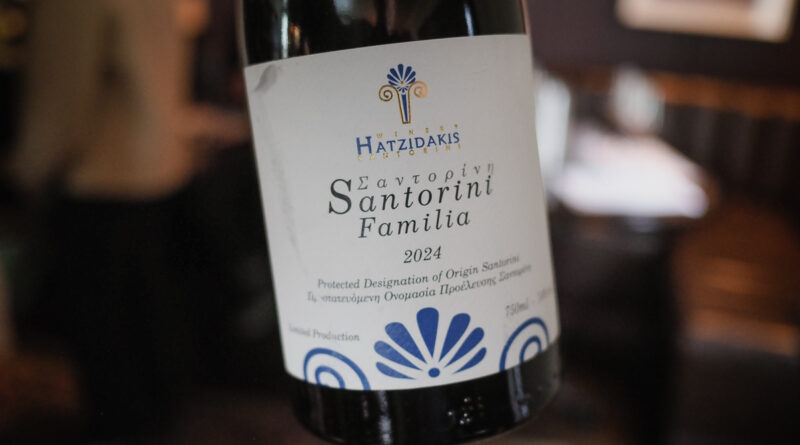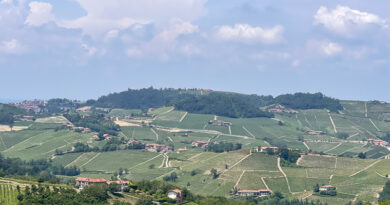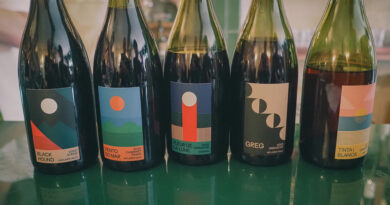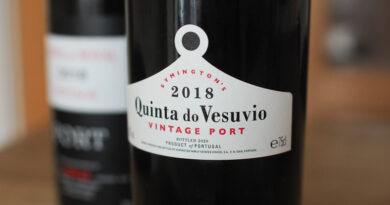Hatzidakis: a deep dive into these top Santorini wines
Website: https://www.hatzidakiswines.gr/
Hatzidakis are one of the best-known producers from the Greek Island of Santorini, and they were in town presenting a big tasting of their range with their importer, Keeling Andrew.
Konstantina Chryssou, who co-founded the winery with Haradimos Hatzidakis (who died aged 50 in May 2017) began with some history. At one stage, Boutari had a winery in Santorini. Haradimos was working as a winemaker there and she was in hospitality, and they met and fell in love.
Her parents had a vineyard in Santorini but had left after the earthquake in 1956 for Athens. Haridimos was interested in reviving it. He saw a cave on the property, and asked what it was. It was where her grandfather had kept a cow and tools for working the vineyard. He suggested that they could put a small winery there. She was used to a fancy winery at Boutari and didn’t realise you could make wine in a cave. So they started replanting the small vineyard, and without any capital began making wines in the 1997 vintage.
‘When Haradimos passed 8 years ago, it was a very difficult period,’ she recalls. ‘Everyone in wine knew Haradimos. We had to decide whether we could carry on as a family or whether we had to sell. We decided to fight, and we have tried the best year by year. We are happy that we can continue the philosophy and legacy of Haradimos.’
Her daughter Stella now runs things. She explained about the special nature of the vineyards in Santorini, which now have UNESCO world heritage status. The vineyards are on terraces made with dry stones. These keep the soils stable and catch the rainfall: it’s very dry here but they don’t irrigate. After the growing season they dig channels in the soil to help with the water infiltration.
They moved on from their initial cave winery to another, larger one. It’s located in the heart of the vineyards, built into the hillside. The underground chambers give a stable temperature, around 16 C all year round, with natural humidity. They can also use gravity to move the grapes and wine around. They have a series of caves to store the wine.
As well as their own vineyards, they work with 65 wine growers. The island’s vineyards use the koloura pruning technique, which creates a sort of nest-like bowl of the previous season’s canes. The vines are all ungrafted. Most of the vineyards are in the south of the island at an altitude of 350 m. It’s a volcanic soil, and the stones can absorb moisture early in the morning.
On the island, there are tiny proportion of landowners who make wine. Most producers have very little or zero land. To be a winery on Santorini, the only way to have the best quality fruit is to have long-term relationships with growers. Many of the grapes are sold on the spot market at harvest time, and there are around 20 producers on the island, and just 4 or 5 have long-term relationships, while everyone else ends up fighting for fruit and is at the mercy of the market. ‘Our wine growers support us,’ says Konstantina. ‘They don’t care about money.’
This last harvest they paid their growers €10 per kg of grapes, while others were paying €12-13 on the spot market. And while everyone else struggled to get grapes in such a low-yielding year as 2025, they had 2 tons of grapes more than the previous year. This is because more growers want to work with them. They only work with Santorini grapes.
Mark Andrew recalls that when he wrote his MW dissertation in 2017, he was trying to make the case for charging more for Santorini wines because grape prices had gone from €1/kg to €5/kg in seven years. Now 8 years later the price has risen to €12. By way of comparison, Assyrtiko from Crete is €1/kg.
Grapes are harvested in August and are kept in a cold room overnight before pressing, so they aren’t processing them warm. They sort the grapes before pressing. They don’t blend different grape varieties. Sometimes they direct press, and other times they destem and do some skin contact. It all depends. Just indigenous yeasts are used, and must is settled for a day at low temperature. They control the fermentation temperature at 16 C.
THE WINES
Hatzidakis Familia 2024 Santorini, Greece
14% alcohol. Their classic Assyrtiko in stainless steel. Powerful, textural and quite salty with lovely bold citrus fruit, as well as some riper melon hints on the fringes. Great concentration, mineral extract and finesse with beautiful purity and a long, warm, spicy finish. This is lovely. 93/100
Hatzidakis Familia 2020 Santorini, Greece
14% alcohol. Some beguiling honeyed, waxy notes on the nose as well as crystalline citrus fruit. The palate is concentrated with lovely complexity and good mineral intensity, showing dried herbs, wax and citrus fruit, with nice depth and good acidity. 93/100
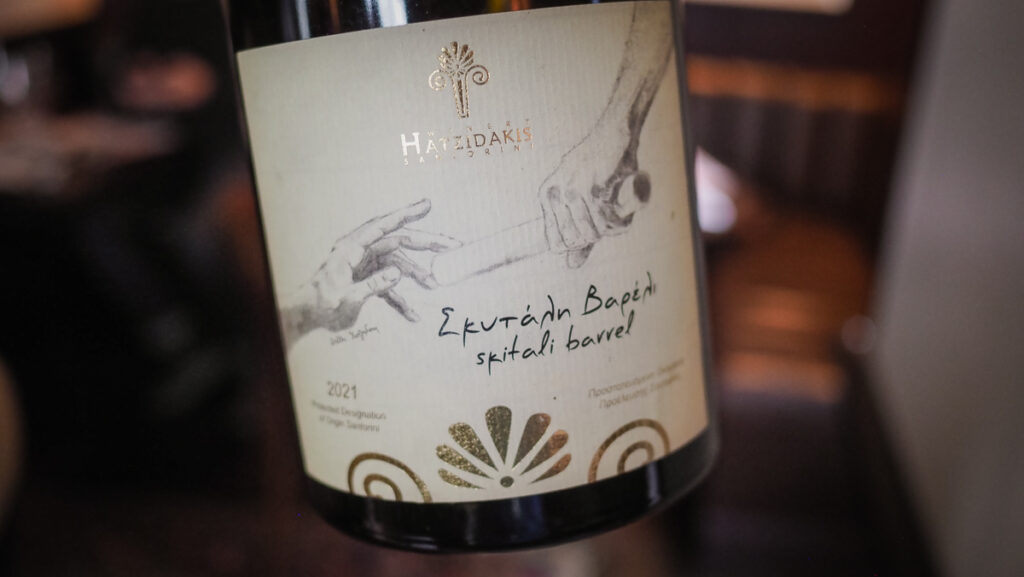
Hatzidakis Skitali 2023 Santorini, Greece
14% alcohol, pH 3.1. Cold maceration, then some work with lees in stainless steel tank. Restrained but nicely complex nose with nice citrus fruit and some fine spicy notes. The palate is lively, quite salty, but with some spicy richness on the palate. Rounded, textural but with nice acidity. Very classy with layers of flavour and lovely mineral detail. 95/100
Hatzidakis Skitali Barrel 2021 Santorini, Greece (magnum)
14.5% alcohol, pH 3. This has one year in stainless steel, then a year in used oak. 300 magnums made each year. This has some nutty, savoury, spicy detail on the nose, then a lively palate with some creamy notes and bright acidity. Lemons, nuts, some salinity and really lovely texture. Has a bit of richness but also amazing precision, and it’s developing really well. 94/100
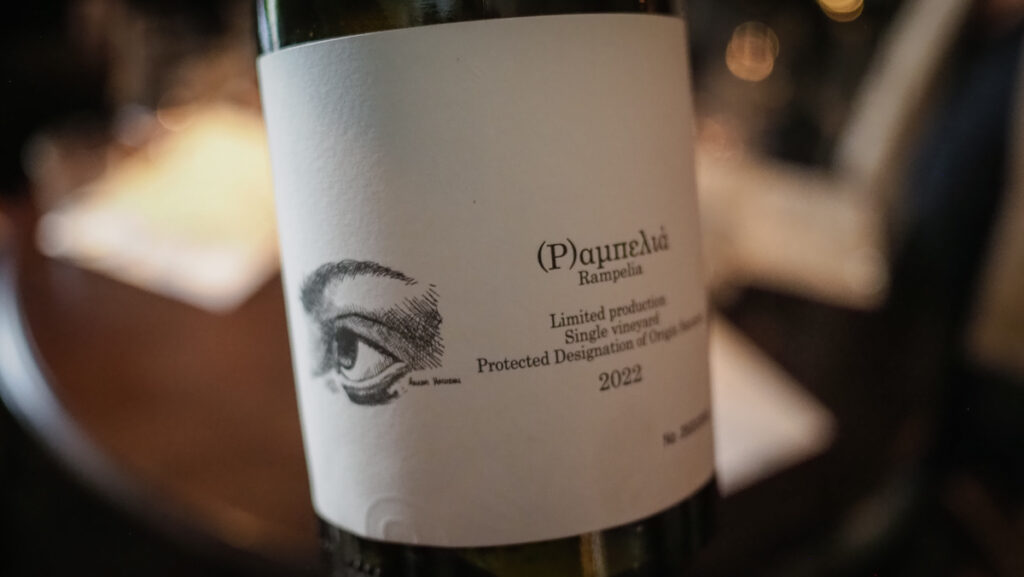
Hatzidakis Rampelia 2022 Santorini, Greece
14% alcohol, pH 3. Single-vineyard Assyrtiko, first vintage 2021. Cold maceration, then after fermentation 70% on lees in stainless steel, 30% French oak. This is concentrated, stony and mineral with nice density to the citrus fruit, as well as some structure and a twist of salinity. Lovely focus here, in a tight, mineral style, finishing with some spicy detail. 93/100
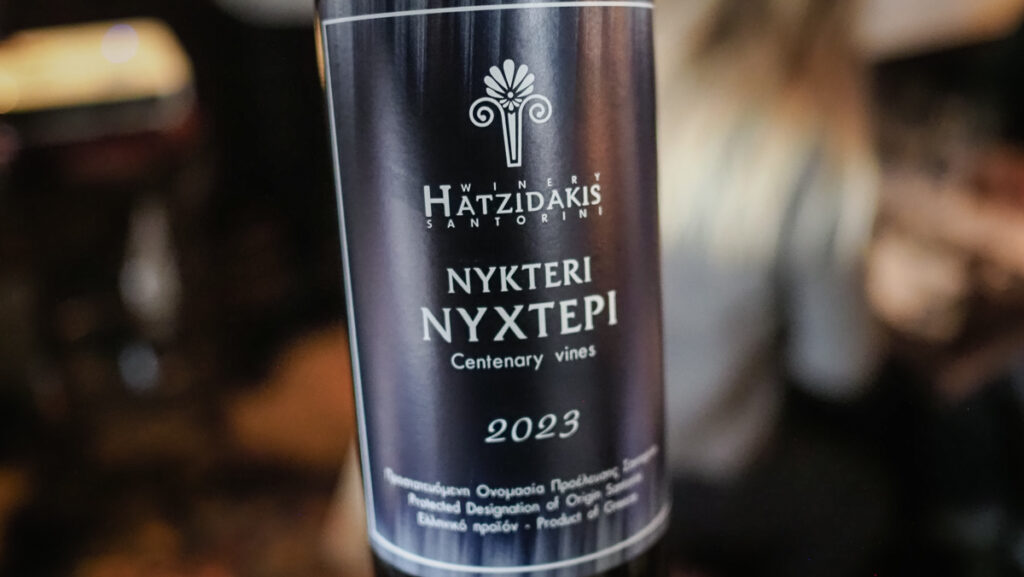
Hatzidakis Nykteri 2021 Santorini, Greece
14.5% alcohol. This means the night-shift in Greek: in the past the grapes used to be pressed at night. This has now become a PDO, and one requirement is a high level of alcohol and 3 months of barrel ageing. Cold maceration then fermentation, followed by maturation in barrel for a year. Powerful, rich, bold and intense with some spicy detail, a touch of marmalade and honey, and lovely crystalline citrus fruit. It’s a big, bold, complex, spice-laden wine of real appeal. 94/100
Hatzidakis Nykteri 2019 Santorini, Greece
15% alcohol. This is rich, spicy, complex and spicy with nice depth and some lemon, mandarin and orange peel notes, with richness and depth, and a touch of creaminess. Lovely depth and weight here in this wine, which finishes long, spicy and saline. 94/100
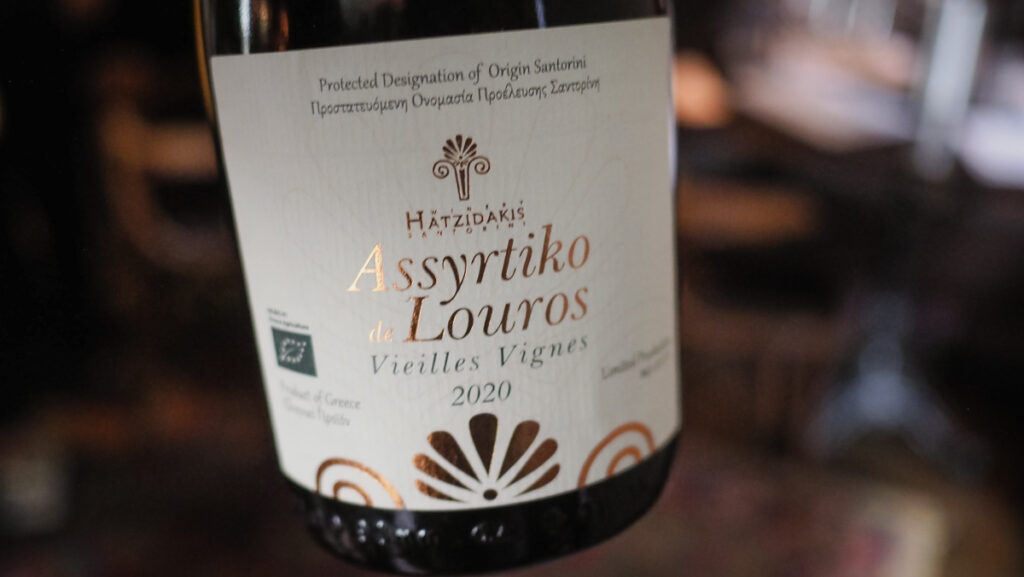
Hatzidakis Louros 2020 Santorini, Greece
15% alcohol. This is from a very old single vineyard, with vines around 300 years old. This has a long skin contact of around a week at low temperature because the skins have nice tannins. The fermentation starts and they use a basket press to press mid-way through fermentation. Then the wine goes to large barrels for 2 years. Yield is 55%. Wax, nuts, honey and spice with powerful citrus fruit and some structure. Orange peel and nuts, with keen acidity. Complex and multilayered with some oxidative hints but also great acidity. A very bold, intense wine. 94/100
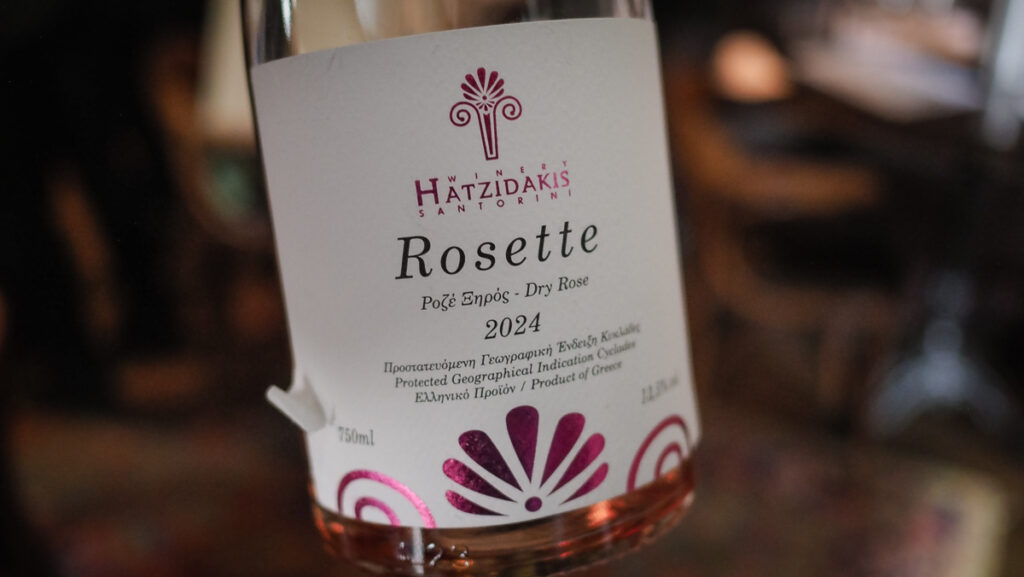
Hatzidakis Rosette 2024 Santorini, Greece
13.5% alcohol. Made from Mandilaria, direct pressed whole bunch, stainless steel. Bright pink in colour. Aromatic and fruity with a lively cherry and raspberry character and nice appealing fruit. Textured and juicy, with sweet fruit but finishes dry. 91/100
Hatzidakis Rosette 2023 Santorini, Greece
13.5% alcohol. Full pink colour. Juicy and lively with bright cherry and raspberry fruit, showing some juiciness and good acidity. Sophisticated and delicious. Has a bit of grip and good acidity on the finish. 93/100
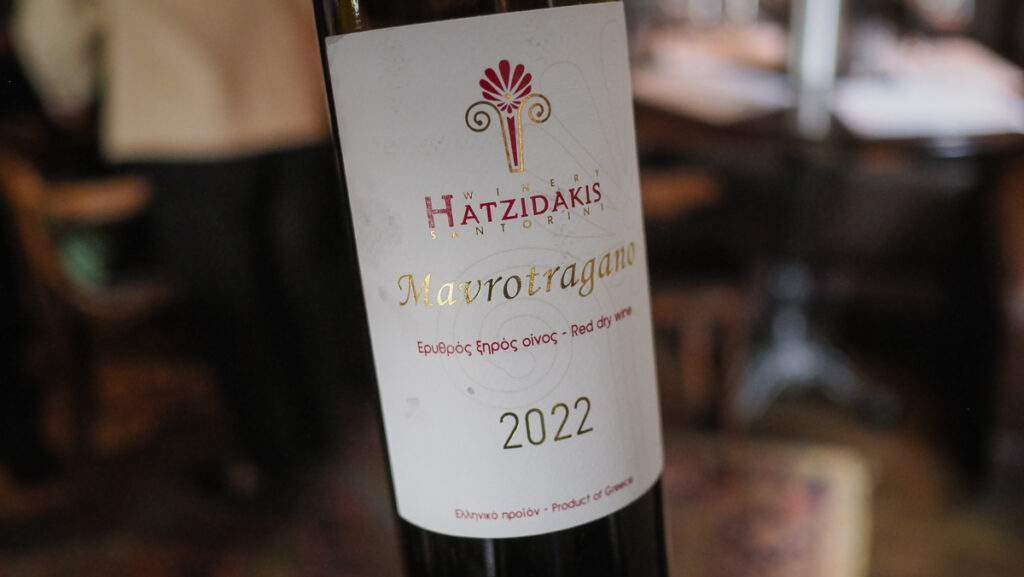
Hatzidakis MavroTragano 2022 Santorini, Greece
13% alcohol. Sorting to remove green berries. Cold maceration followed by long fermentation, then basket pressed. Matured for 18 months in second and third use small oak. Concentrated, pure, juicy and vivid, with good acidity and some nice tannins, showing some black cherry and blackberry fruit with a touch of nice sourness on the finish. Lovely brightness and intensity to this wine. I love the acidity here. 95/100 (Hatzidakis was the first to make a single variety wine from this grape back in 1997)
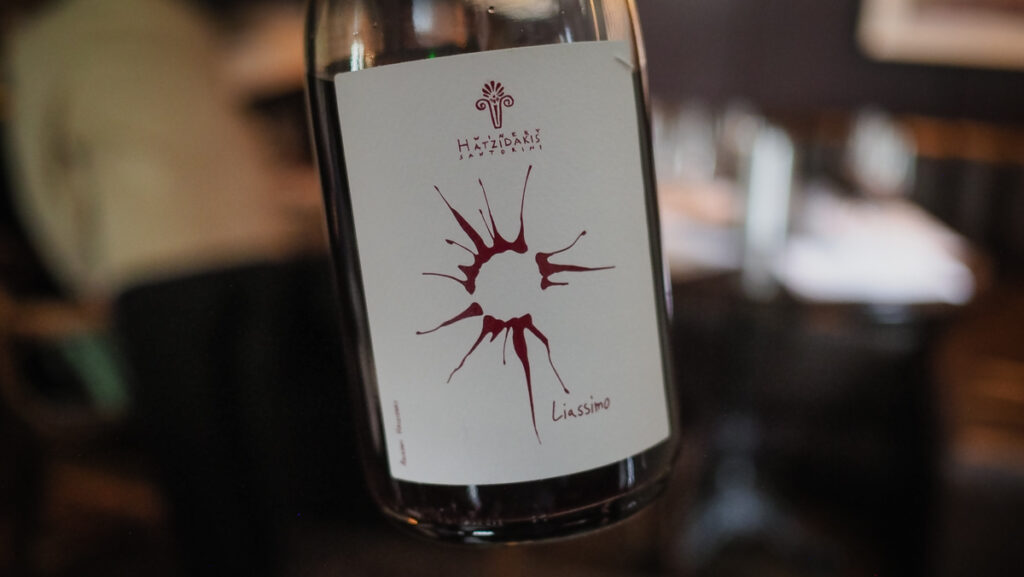
Hatzidakis Liassimo NV Santorini, Greece
10% alcohol, 310 g/l sugar, 12 g/l acidity, pH 2.94. Mandilaria, sun dried 10-14 days. Solera style, 2002 until 2021, with some fresh 2022 in the blend. Sweet, rich and raisiny with lots of sweetness but also amazing acidity that takes over on the finish. Some structure here but also richness. Really complex and lively with amazing contrasts of flavour. 93/100
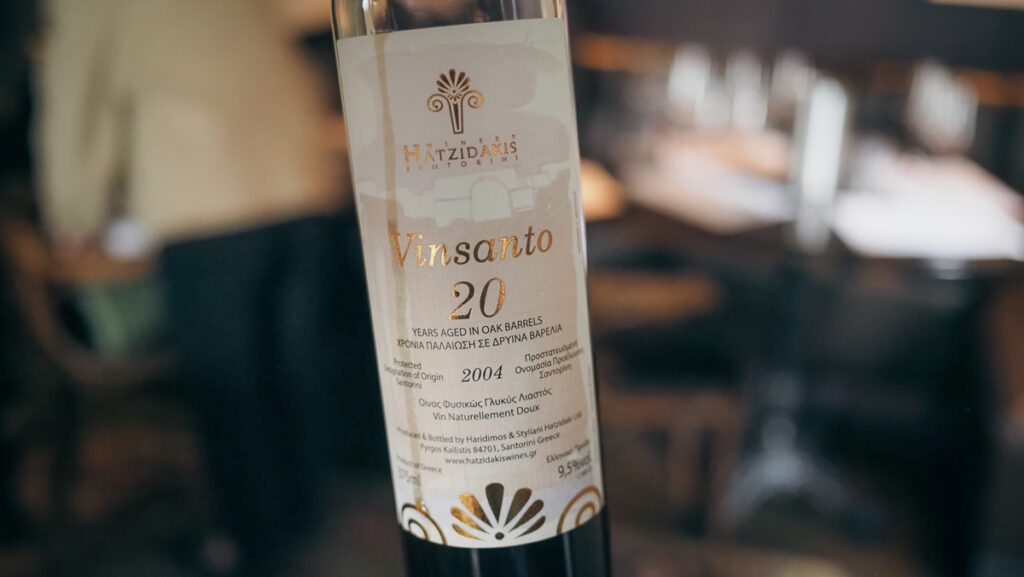
Hatzidakis Vinsanto 20 2004 Santorini, Greece
Sun dried for 15 days. Local white varieties only, with 80% Assyrtiko. Matured in small oak for 20 years. 304 g/l rs, 11 g/l acid, pH 3. Really concentrated, rich and powerful with raisiny depth, some orange peel, lively lemons and nice structure, with keen acidity balancing the immense sweetness. Such power and complexity here. 95/100
Older notes from March 2017:
Hatzidakis Aidani 2016 Cyclades, Greece
100% Aidani. Tank fermented. Stony, mineral and bright with lovely intensity. Citrus, pear and mineral notes. Very fine. 91/100
Hatzidakis Santorini 2016 Santorini, Greece
Tank fermented Assyrtiko. This is very linear and stony with lovely bright citrus fruit. Pure and linear with intense mineral character. Fresh, pure and lovely. 93/100
Hatzidakis Cuvée No 15 2015 Santorini, Greece
Organic Assyrtiko. There’s a lovely nutty edge to the fruit. Citrus, nuts and pears with nice freshness and lots of depth. Stony, nutty and delicious. 93/100
Hatzidakis Assyrtiko de Mylos Vielles Vignes 2016 Santorini, Greece
Very rich and bold textured with spice and apple, and a vivid bite to it. Crisp and intense with lovely precision allied to ripeness. Has a pithy, mineral edge. Such interest here: superb stuff, with so much concentration and salinity. 95/100
Hatzidakis Nykteri Assyrtiko 2015 Santorini, Greece
Late harvested and aged for a year in oak. Detailed, spicy and showing a slightly minty, savoury cedary edge to the stony fruit. Linear and detailed. 91/100
Hatzidakis Nykteri Assyrtiko 2014 Santorini, Greece
A late-harvested Assyrtiko weighing in at 15% alcohol. Overnight skin contact lends this a deep colour, and it’s oak aged for 15 months, only partially topped. Intense, spicy and vivid with some marmalade and citrus, as well as keen acidity. Rich and powerful, yet with some freshness, spiciness and good acidity. 91/100
Hatzidakis Assyrtiko de Louros 2014 Santorini, Greece
Three years in barrel. 100-120 year old vines, harvested late. Intense, vivid and spicy with powerful nutty, cedary notes and some minerals and spice. 92/100

